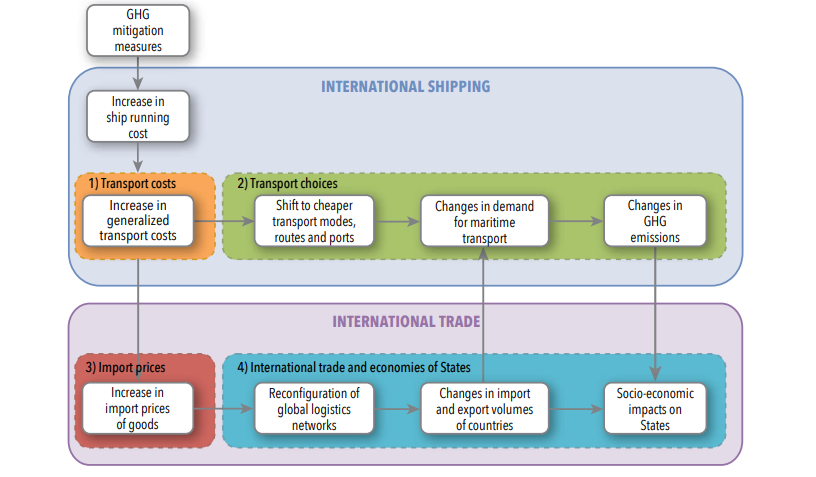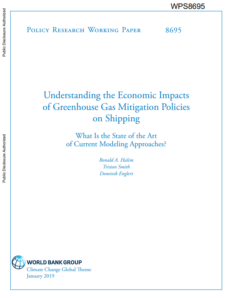IMO’s initial strategy on GHG reduction from ships stipulates that the industry should assess the impacts on states prior to adoption of the mitigation measures. Introducing greenhouse gas mitigation measures, such as carbon prices applied to bunker fuels in the range of 10 to 50 USD/ton of CO2, might increase maritime transport costs by 0.4% – 16%, according to a new report by the World Bank. However, this would only marginally increase the import prices of goods (by less than 1%).
The paper advises that this assessment should be undertaken as a matter of urgency, and disproportionately negative impacts should be assessed and addressed as appropriate.
This report namely aims to contribute to this discussion by reviewing the research on the economic impacts of GHG mitigation measures on states, using model-based analysis. Specifically, the paper:
- identifies four areas of economic impacts and their relationships,
- compiles the latest findings on the estimated magnitudes of these impacts, and
- presents relevant modeling approaches along with best practices for selecting and applying these approaches in impact assessments.
Four economic impact areas
The paper breaks the economic impacts down into the following areas:
- Transport costs;
- Transport choices;
- Import prices of goods; and
- International trade and economies of States.
Findings
GHG mitigation measures affect State economies through a chain of causalities:
- The GHG mitigation measure increases costs of running a ship, be it through higher fuel prices (due to a levy or other market mechanism) or higher capital costs as carriers invest in new technologies and vessels or other emissions reduction solutions. These higher costs lead to higher freight rates, or “transport costs,” for clients. These may not be incurred immediately depending on market structures, trade balances, or possible cross-subsidies, but it can safely be assumed that higher transport costs will eventually lead to higher prices.
- Higher transport costs may cause shippers in international freight transport networks to shift to cheaper alternative modes and routes of transport, which can impact State economies.
- Increases in transport costs may inflate import prices of goods and reduce the volume of commodities traded worldwide.
- In the long term, increases in import prices may cause firms to relocate their manufacturing facilities or consumers to substitute local or cheaper products for the import. On a global scale, this could lead to changes in States’ export and import volumes, which eventually impact States’ gross domestic products (GDP) and other socio-economic performances.

Recommendations
- No need to reinvent the wheel: Much existing groundwork that can be leveraged to better understand economic impacts, both globally and on specific States. There is no significant need for the development of new models or additional analytical tools.
- “Kaizen” — continuously improve and innovate: As modeling expertise, computing technology, and data availability continue to improve, the quality of information on economic impacts will continue to improve. Policy makers are encouraged to work closely with academic and business experts to effectively advance the relevant policy discussions.
- Prioritization: There is not a single model that can solely deliver on all possible impact assessment objectives. Prioritization is key, and these priorities must be reflected in the choice of the model.
- Do not let perfect be the enemy of the good: The studies reviewed in this paper have shown that the use of simpler models with fewer data requirements can still provide very valuable insights on specific economic impact areas and can still make important contributions to the time-critical policy discussion.
- Seeing the forest for the trees: If initial studies in the literature suggest insignificant impacts a full impact assessment for a GHG mitigation measure might not be needed and scarce research resources can be allocated to more significant economic impact area and geographic locations.
This work was carried out on behalf of the World Bank Group under a joint collaboration with the OECD International Transport Forum (OECD ITF) and the University College London.
Explore more herebelow:


































































